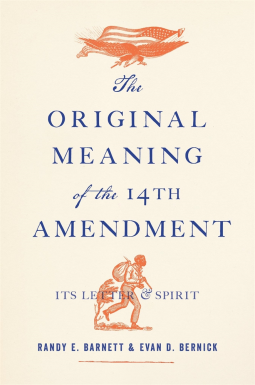
The Original Meaning of the Fourteenth Amendment
Its Letter and Spirit
by Randy E. Barnett and Evan D. Bernick
This title was previously available on NetGalley and is now archived.
Send NetGalley books directly to your Kindle or Kindle app
1
To read on a Kindle or Kindle app, please add kindle@netgalley.com as an approved email address to receive files in your Amazon account. Click here for step-by-step instructions.
2
Also find your Kindle email address within your Amazon account, and enter it here.
Pub Date Nov 02 2021 | Archive Date Nov 02 2021
Harvard University Press | Belknap Press
Talking about this book? Use #TheOriginalMeaningoftheFourteenthAmendment #NetGalley. More hashtag tips!
Description
A renowned constitutional scholar and a rising star provide a balanced and definitive analysis of the origins and original meaning of the Fourteenth Amendment.
Adopted in 1868, the Fourteenth Amendment profoundly changed the Constitution, giving the federal judiciary and Congress new powers to protect the fundamental rights of individuals from being violated by the states. Yet, according to Randy Barnett and Evan Bernick, the Supreme Court has long misunderstood or ignored the original meaning of the amendment’s key clauses, covering the privileges and immunities of citizenship, due process of law, and the equal protection of the laws.
Barnett and Bernick contend that the Fourteenth Amendment was the culmination of decades of debates about the meaning of the antebellum Constitution. Antislavery advocates advanced arguments informed by natural rights, the Declaration of Independence, and the common law. They also utilized what is today called public-meaning originalism. Although their arguments lost in the courts, the Republican Party was formed to advance an antislavery political agenda, eventually bringing about abolition. Then, when abolition alone proved insufficient to thwart Southern repression and provide for civil equality, the Fourteenth Amendment was enacted. It went beyond abolition to enshrine in the Constitution the concept of Republican citizenship and granted Congress power to protect fundamental rights and ensure equality before the law. Finally, Congress used its powers to pass Reconstruction-era civil rights laws that tell us much about the original scope of the amendment.
With evenhanded attention to primary sources, The Original Meaning of the Fourteenth Amendment shows how the principles of the Declaration eventually came to modify the Constitution and proposes workable doctrines for implementing the key provisions of Section 1 of the Fourteenth Amendment.
Randy E. Barnett is the Patrick Hotung Professor of Constitutional Law at the Georgetown University Law Center. A Guggenheim fellow and Supreme Court advocate, he is the author of The Structure of Liberty, Restoring the Lost Constitution, and Our Republican Constitution. Evan D. Bernick is Visiting Professor of Law at the Georgetown University Law Center. He previously clerked on the US Court of Appeals for the Seventh Circuit. His scholarship appears in the Georgetown Law Journal, the Notre Dame Law Review, and the William & Mary Law Review.
Available Editions
| ISBN | 9780674257764 |
| PRICE | $35.00 (USD) |



